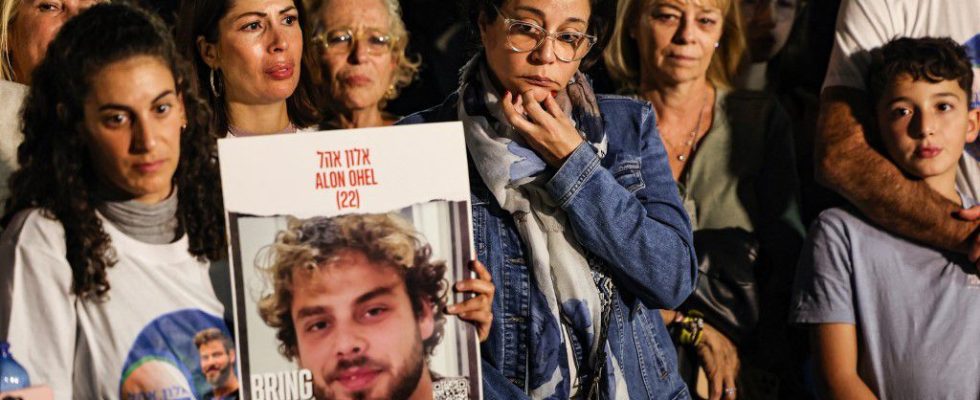A first diplomatic breakthrough, on the 47th day of the war. Israel and Hamas announced on Wednesday night that they had reached an agreement providing, from Friday, for a four-day truce and the release of 50 Israeli hostages in exchange for 150 Palestinian prisoners. The realization of the diplomatic efforts undertaken for weeks by Doha with Washington and Cairo to negotiate a pause – for now temporary – in this conflict triggered by the unprecedented attack of the terrorist group against the Hebrew state on October 7. “This shows that the discussion channels work and that intermediaries play their role,” said Etienne Dignat, associate researcher at the Sciences Po International Research Center (CERI) and author of The price of terror: Governing the hostage market (PUF, 2023).
L’Express: What is your view on the agreement that was concluded on Wednesday between Hamas and Israel?
Etienne Dignat: If this release comes together as planned, then it is a positive signal. It is rare to see such a massive exchange of prisoners materialize in this type of situation. This shows that the discussion channels are working and that intermediaries are playing their role. Above all, in my opinion, this is an agreement that satisfies everyone. Israel first, to the extent that this allows it to obtain the return of women and children who had been taken hostage on October 7. This is obviously a very important issue for the Israeli population.
More broadly, this agreement is welcome for Westerners. It should allow them to free some of their citizens, without having to be at the front line to negotiate, nor having to make concessions on their own behalf.
As for Hamas, it is also beneficial. This firstly allows him to release a form of pressure. Already military pressure, because there is a truce, but also pressure on its population which is bearing the brunt of Israeli attacks. Then, this gives him the opportunity to come out of a posture of passivity. If, until now, it was only subjected to the Israeli military response, this agreement allows it to show that it is capable of obtaining concessions from the opposing party and that it is an actor on which it is necessary to count. He thus reaffirms his leadership in Gaza, but also vis-à-vis the Palestinian Authority.
What can happen after the four days of truce?
It’s hard to say. Benjamin Netanyahu affirmed that he was determined to resume fighting once the truce ended. However, the Israelis indicated that they were prepared to grant additional days of truce, if further releases of hostages were looming. The door therefore seems to remain open, and we cannot exclude that the truce will continue over time.
Can this agreement be a first step towards a political solution to this conflict?
It’s very difficult to say as the positions seem antagonistic. But we can hope that the discussion channels that were established during this first phase of negotiations will continue to be used to conduct other talks with a view to freeing more hostages or obtaining a ceasefire. As long as there is contact, it is part of the range of possibilities. In the past, it has been observed in other countries, such as Colombia, that the release of hostages has opened the way to broader negotiations. Can this process happen the same way here? It is too early to say.
Emmanuel Macron said on Wednesday that he was working “tirelessly to ensure that all the hostages are freed”. Is this a possible scenario?
This request was actually made by the French president, and we can easily understand it: all the countries involved, whether France, the United States, Israel or Qatar, are aiming for the release of all the hostages. However, this is a difficult goal to achieve for several reasons. First of all, the hostages are not all held by Hamas. Some are carried out by Islamic Jihad, or other armed groups, which complicates negotiations. Then, it is also not certain that Israel will accept the new concessions that could be asked of it, especially if the profiles of the prisoners to be released change.
Added to this is the fact that Hamas probably has no interest in freeing all the hostages. Indeed, as long as he retains it, he retains his ability to blackmail. It should therefore rather release them piecemeal, in order to maintain a means of pressure to obtain, for example, humanitarian aid or fuel.
Is the question of the release of combatants particularly delicate?
Absolutely. When it comes to soldiers, things are more complicated for three reasons. The first is that, from the start, the Israeli government focused on the release of civilians. The second is that Hamas considers the soldiers to be enemies by nature, because they wear Israeli uniforms. From then on, he will be less inclined to release them. The third thing is that Hamas will probably seek to bring into play a principle of equivalence, that is to say, to request the release of its own fighters in exchange for the release of Israeli soldiers. However, this seems difficult to accept for Israel given the great security fears that have gripped society since the October 7 attack.
Does this agreement reinforce Qatar’s role as mediator on the international scene?
Qatar is the country that emerges as the big winner of these negotiations. He appears to be an indispensable player, who has good networks and is capable, on certain issues, of obtaining what the West or their allies ask for. By playing, moreover, a mediating role that the latter did not want or could not play. These negotiations are therefore a way for Qatar to maintain good relations with all parties and to assert itself as an important diplomatic actor. Which he will not fail to remind in due time when he needs it. Given its complex regional neighborhood, it is important for this small Gulf country to consolidate its alliances.
.
